Stocks & Indexes
October 14, 2006 0:30 a.m. ET (2:30 p.m. AET)
The next newsletter (an update on Gold, Crude Oil and the Dollar) will be on October 17th.
Crude oil confirmed its break below support at $60/barrel and appears headed for a test of $55. The dollar has strengthened to $1.25 against the euro. Falling fuel costs and lower long-term interest rates may stimulate the economy, but too fast a recovery would raise inflationary pressures and revive fears of further rate hikes. Gold recovered to $589.50, but is trending downwards in the medium term. The probability of recession in the next four quarters increased to a moderate 39 per cent according to the Wright model.
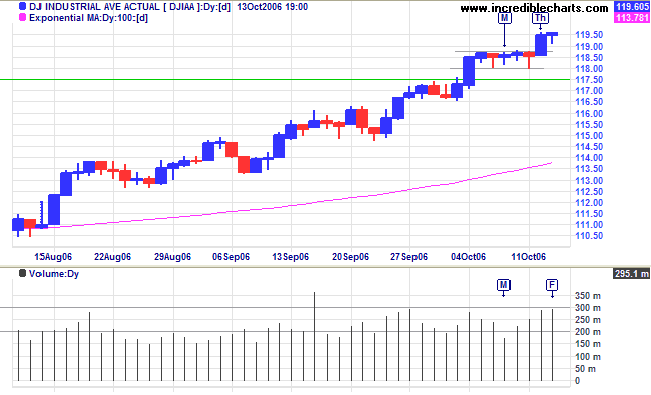
Long Term: The Dow remains in a primary up-trend, with support at 10700. A new high on the Transport Index would confirm a bull market.
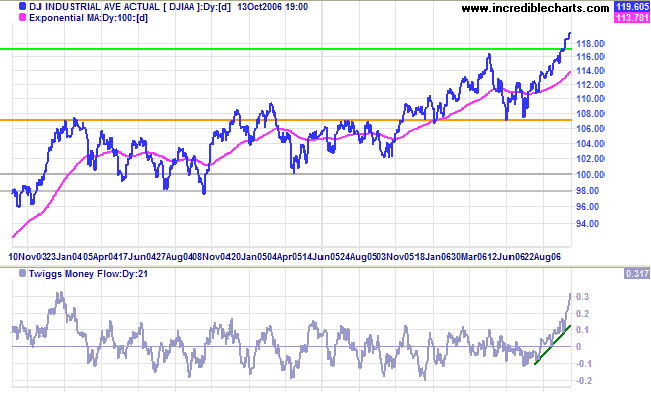
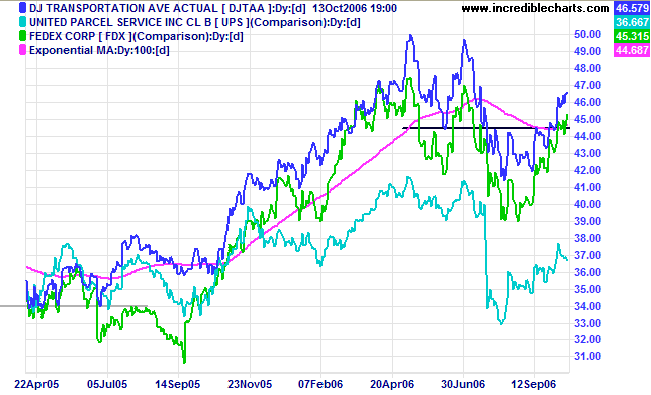
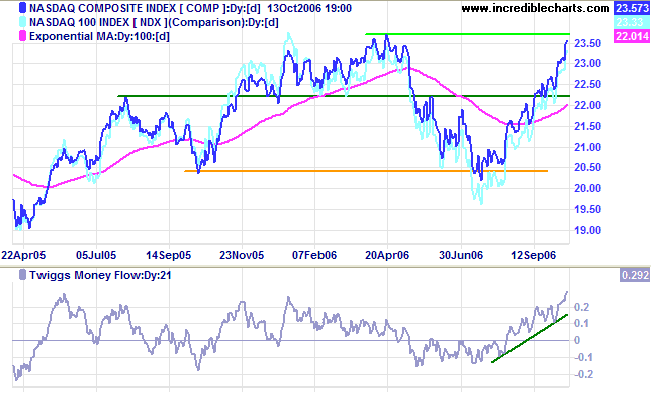
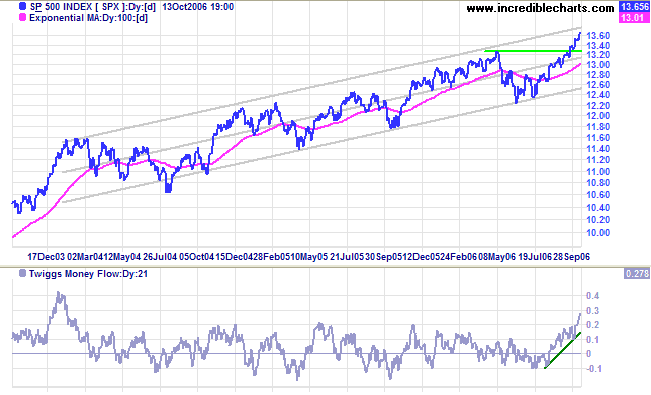
Long Term: The S&P 500 continues in a primary up-trend with support at 1220.
The FTSE 100 rallied strongly to close above the April high of 6130 -- a bullish sign. A retracement that respects the new support level at 6130/6100 would confirm the breakout.
Medium Term: The target for the breakout is 6700 (calculated as 6100 + {6100 - 5500}). Twiggs Money Flow (21-day) signals strong medium-term accumulation.
Long Term: The primary trend is up, with support at 5500.
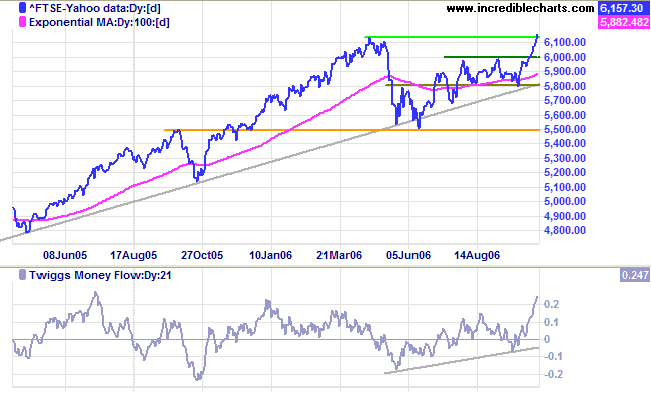
Despite uncertainty caused by North Korean nuclear tests, the Nikkei 225 has so far respected the first line of support at 16400. A rise above 16600 would confirm the strong up-trend. Narrow candles, however, signal uncertainty and further closes below 16400 would confirm this.
Medium Term: The latest rally is headed for a test of the April high of 17500. Twiggs Money Flow (21-day) is improving, but will only offer a strong signal if the latest trough above zero is completed.
Long Term: The index is in a primary up-trend, with support at 14200.
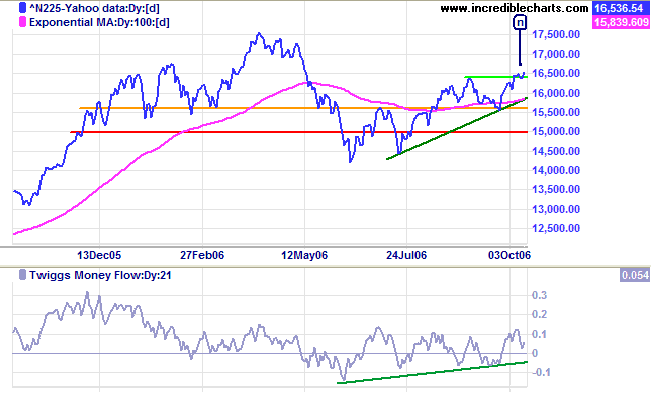
The All Ordinaries started the week with a bullish short retracement at [M] followed by a rally on strong volume on Tuesday/Wednesday. Strong volume continued on the short retracement at [Th], signaling increased resistance. The theme continued on Friday, with a tall shadow indicating profit-taking. A follow-through above Friday's high would signal that buyers have regained control, while a fall below Thursday's low (though less likely) would mean further retracement.
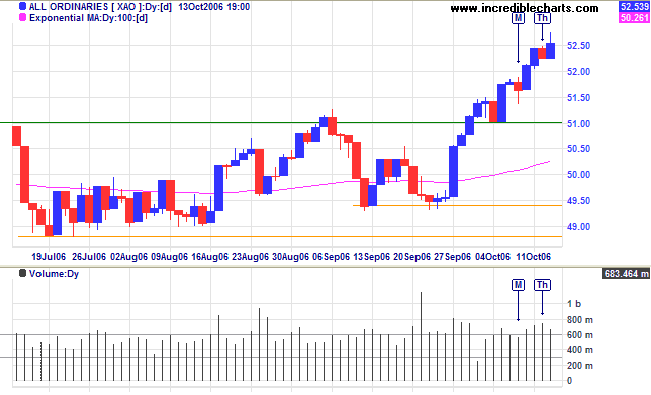
Long Term: The All Ordinaries is in a primary up-trend with support at 4800.
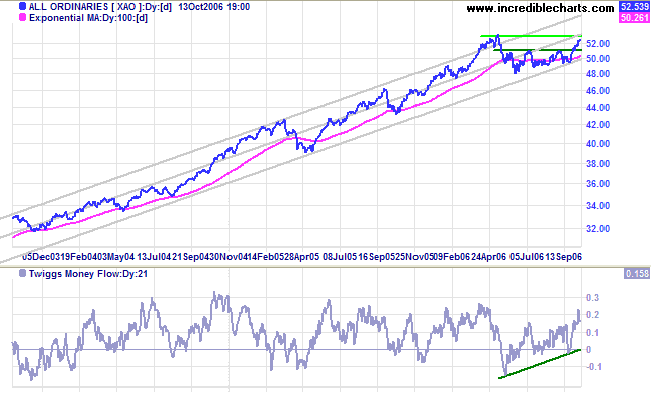
but planning is indispensable.
~ Dwight D Eisenhower
|
Predictions I believe that Technical Analysis should not be used to make predictions because we never know the outcome of a particular pattern or series of events with 100 per cent certainty. The best that we can hope to achieve is a probability of around 80 per cent for any particular outcome: something unexpected will occur at least one in five times. My approach is to assign probabilities to each possible outcome. Assigning actual percentages would imply a degree of precision which, most of the time, is unachievable. Terms used are more general: "this is a strong signal"; "this is likely"; "expect this to follow"; "this is less likely to occur"; "this is unlikely"; and so on. Bear in mind that there are times, especially when the market is in equilibrium, when we may face several scenarios with fairly even probabilities. Analysis is also separated into three time frames: short, intermediate and long-term. While one time frame may be clear, another could be uncertain. Obviously, we have the greatest chance of success when all three time frames are clear. The market is a dynamic system. I often compare trading to a military operation, not because of its' oppositional nature, but because of the complexity, the continual uncertainty created by conflicting intelligence reports and the element of chance that can disrupt even the best made plans. Prepare thoroughly, but allow for the unexpected. The formula is simple: trade when probabilities are in your favor; apply proper risk (money) management; and you will succeed. For further background, please read About The Trading Diary. |

Author: Colin Twiggs is a former investment banker with almost 40 years of experience in financial markets. He co-founded Incredible Charts and writes the popular Trading Diary and Patient Investor newsletters.
Using a top-down approach, Colin identifies key macro trends in the global economy before evaluating selected opportunities using a combination of fundamental and technical analysis.
Focusing on interest rates and financial market liquidity as primary drivers of the economic cycle, he warned of the 2008/2009 and 2020 bear markets well ahead of actual events.
He founded PVT Capital (AFSL No. 546090) in May 2023, which offers investment strategy and advice to wholesale clients.
